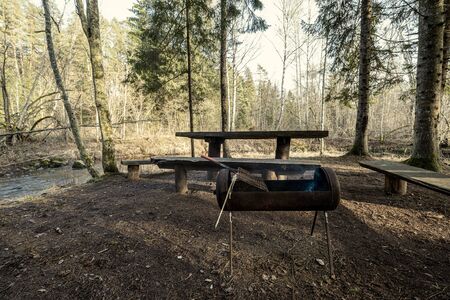Introduction to Wild Camping and Stealth Parking
For many families across the UK, there’s something truly magical about packing up the campervan and heading off into the countryside. Whether it’s the rolling hills of the Lake District or the rugged coastline of Cornwall, the great British outdoors offers a wealth of adventure for parents and children alike. Wild camping and stealth parking have become increasingly popular ways for families to connect with nature, escape the crowds, and create treasured memories together. But what exactly do these terms mean, and why are they so appealing?
Wild camping refers to pitching up in remote or non-designated spots—outside of traditional campsites—often surrounded by nothing but nature. For adventurous families, this means waking up to birdsong, exploring hidden trails, and enjoying evenings under a canopy of stars. Stealth parking, on the other hand, is all about discreetly spending the night in your campervan—perhaps in a quiet layby or tucked away near a scenic spot—without drawing attention to yourself or disturbing others.
The appeal is easy to understand: it’s freedom at your fingertips, flexibility in your plans, and often a more affordable way to travel. It allows parents to introduce their little ones to the wonders of the natural world, while also teaching respect for the environment and local communities. As we explore these grey areas together, we’ll look at why wild camping and stealth parking have captured the hearts of so many UK families—and what you need to know before setting out on your own campervan adventure.
Understanding the Legal Landscape
When planning a campervan adventure across the UK, understanding the legal framework for wild camping and overnight parking is essential for a worry-free journey. The rules can be confusing because they vary not only between wild camping and stealth parking, but also across England, Scotland, Wales, and Northern Ireland. Here’s a clear breakdown to help you navigate these grey areas:
| Region | Wild Camping Laws | Overnight Parking Regulations |
|---|---|---|
| England | Generally not permitted without landowner’s permission. Some exceptions exist in Dartmoor National Park, but recent legal changes have restricted even this. | Most car parks and laybys prohibit overnight stays. Always check local signs or council rules. |
| Scotland | Permitted under the Scottish Outdoor Access Code, except in certain restricted areas (like Loch Lomond & The Trossachs). Responsible behaviour is expected. | Some councils allow overnight parking in designated spots. Restrictions apply in busy tourist areas. |
| Wales | Similar to England—permission from landowners is required. National parks do not have blanket permissions. | Local authorities may allow limited overnight parking; always confirm locally. |
| Northern Ireland | No automatic right to wild camp; landowner consent is needed everywhere. | Strict regulations on public land; private sites are your best bet for overnight stays. |
Key Distinctions Across Regions
England & Wales: Landowner Permission is Crucial
If you’re travelling in England or Wales, remember that all land is owned by someone—public or private. Wild camping without explicit consent may lead to being asked to move along or, in rare cases, fines. National Parks do not generally offer special privileges for wild campers.
Scotland: More Freedom with Responsibility
The Scottish Outdoor Access Code gives much greater freedom, provided you camp responsibly and respect restrictions in conservation zones. This makes Scotland particularly attractive for families seeking a wilder experience—but be sure to follow local guidelines and signage.
Northern Ireland: Be Cautious and Plan Ahead
Northern Ireland takes a stricter approach, with little tolerance for unauthorised camping or overnight parking on public land. Booking official campsites or seeking direct permission is highly recommended.
Your Family’s Peace of Mind Starts with Knowledge
The UK’s patchwork of laws can seem daunting, but knowing the basics helps ensure your family’s trip is safe, legal, and enjoyable. Always research your planned stops, check local council websites, and if in doubt—ask before you park or pitch!

3. Navigating the Grey Areas
When it comes to wild camping and stealth parking with your campervan in the UK, families often find themselves tiptoeing through a maze of unclear rules and local traditions. The law itself isn’t always black and white—there are plenty of ambiguous corners that can leave even the most well-meaning campers scratching their heads. For example, while wild camping is generally not permitted in England and Wales without landowner permission, certain rural spots may be more accepting as long as you’re respectful and discreet. In Scotland, the rules are more relaxed thanks to the Scottish Outdoor Access Code, but even there, guidelines urge campers to avoid causing disturbance or damage.
Many families wonder if an overnight stop in a layby or quiet car park counts as camping or just resting—and unfortunately, the answer isn’t always clear-cut. Local councils can set their own by-laws, which might differ from one village to the next. Sometimes, signs will helpfully tell you when overnight stays are forbidden; other times, you’re left to weigh up the risks yourself. For parents hoping to create magical memories under the stars without breaking any rules, this uncertainty can be unsettling.
It’s not uncommon for families to hear stories from friends or social media groups about being moved on by local authorities or waking up to a polite note on their windscreen. While these tales can feel daunting, most encounters end amicably when campers show respect for local communities and tidy up after themselves. Still, it’s easy to see why so many families crave clearer guidance—they want their adventures to be full of giggles around the campfire, not anxious glances at the car park entrance.
4. Best Practices for Responsible Campervan Adventures
Venturing into the wild with your campervan is a thrilling family experience, but it’s essential to balance adventure with responsibility. In the UK, wild camping and stealth parking operate within a “grey area” of law and social acceptance. Following best practices ensures you keep your loved ones safe, respect local communities, and preserve the natural beauty for future explorers.
Family Safety Comes First
Before you settle for the night, prioritise your familys safety. Choose well-lit areas away from busy roads, check your surroundings for hazards, and always have an exit route planned. Teach children about local wildlife and potential risks—turning every trip into a learning opportunity.
Safety Checklist
| Action | Reason |
|---|---|
| Park on level ground | Prevents accidental rolling and ensures restful sleep |
| Check mobile signal | Essential in case of emergencies |
| Keep valuables out of sight | Reduces risk of theft or unwanted attention |
| Know nearest facilities | Quick access to help if needed |
Respecting Local Communities & Unwritten ‘Rules’
The British countryside is dotted with small villages and tight-knit communities. When wild camping or stealth parking:
- Avoid residential driveways or blocking access points.
- Arrive late, leave early: Minimise your presence by staying discreet.
- Support local businesses: Pop into village shops or cafes to buy supplies or say hello—it fosters goodwill.
- No loud noises after dark: Keep voices low and entertainment inside your van.
- If in doubt, ask: A friendly word with locals or landowners can often lead to helpful advice—or a warm welcome!
Leave No Trace: Caring for Nature Together
The golden rule for all campervan adventurers is to leave every site exactly as you found it—or better. Involve your children in a mini “tidy-up mission” before you go. This not only teaches them responsibility but also preserves the joy of wild spaces for everyone.
Quick Guide: Leave No Trace Principles (UK-Style)
| Principle | How to Achieve It as a Family |
|---|---|
| Take rubbish home | Packing up together at the end of each stay—make it a family game! |
| Bury toilet waste responsibly (or use facilities) | Teach older children about privacy and eco-friendly solutions; use public loos where possible. |
| Avoid campfires unless permitted | If you must cook, use a portable stove and ensure it’s cool before storing away. |
| Protect plants & wildlife | Stick to paths when exploring, don’t pick flowers or disturb habitats. |
| No trace of your stay | A final walk-around as a family—can you spot any forgotten items? |
By embracing these best practices, your campervan adventures across the UK will be memorable for all the right reasons—full of fun, learning, and kindness towards people and places alike.
5. Family Stories: Real UK Experiences
One of the best ways to understand the reality of wild camping and stealth parking in the UK is by hearing from families who have experienced it first-hand. These stories not only reassure us but also help us feel connected to a community of adventurous parents and curious children.
The Smiths’ Highland Hideaway
The Smith family—mum, dad, and two lively kids—decided to try wild camping along the North Coast 500 in Scotland. They carefully researched places where overnight stays were tolerated and made sure to ask locals for advice. “We found a lovely spot near a loch,” Mrs. Smith shares, “and made sure we left no trace behind. The children loved spotting deer at dawn, and knowing we were following local guidance made us all feel safe.”
The Patel’s Stealth Adventure in Cornwall
The Patels took their campervan to the Cornish coast during half-term. After a long day exploring hidden coves, they parked discreetly in a layby away from main roads. “We cooked dinner inside and played cards until bedtime,” Mr. Patel recalls. “The kids thought it was like a secret sleepover! We always checked for signs and respected quiet hours so as not to disturb anyone.”
Learning from Each Other
Many UK families agree that planning is key—knowing your route, understanding local laws, and having backup options brings peace of mind. It’s common to hear how parents involve their children in the process: choosing campsites, helping tidy up, or reading about the places they visit. One mum from Yorkshire said, “My son loves being our ‘bin monitor,’ making sure we leave everywhere cleaner than we found it!”
Respect and Reassurance
Hearing these real-life experiences shows that with respect for nature, awareness of legalities, and a bit of family teamwork, wild camping and stealth parking can be memorable adventures. Parents often report that the sense of freedom—waking up somewhere beautiful, sharing stories under the stars—outweighs any worries about navigating the grey areas of UK laws.
Family Wisdom
As one parent wisely put it: “It’s all about being considerate—to people, places, and each other. With that mindset, you’ll always find your way.” Whether you’re new to wild camping or an old hand, these stories remind us that every trip can be a safe and happy adventure when approached with care.
6. Where to Get Support and More Information
Venturing out in your campervan with the family can be both thrilling and a little daunting, especially when navigating the UK’s patchwork of rules around wild camping and overnight parking. Thankfully, there are plenty of resources and friendly communities ready to help you camp responsibly and confidently.
Trusted UK Organisations
If you’re unsure about the do’s and don’ts, it’s wise to connect with well-established organisations for up-to-date guidance. The Camping and Caravanning Club offers comprehensive advice on sites, etiquette, and legal matters for families. The Caravan and Motorhome Club is another invaluable resource, providing members access to a wide network of approved locations and expert support. For Scotland-specific advice, check out Scottish Outdoor Access Code, which explains your rights and responsibilities when enjoying the countryside.
Helpful Apps for Families
Modern technology can make finding safe, legal spots much easier. The Park4Night app is beloved by many UK vanlifers—it helps you discover user-reviewed places suitable for overnight stays, from official sites to quiet lay-bys. Searchforsites is another favourite, packed with detailed listings across the UK. Both apps allow you to filter for family-friendly facilities, so everyone—from toddlers to teens—can enjoy a hassle-free stopover.
Community Support: Share and Learn Together
The UK has a warm community spirit among campervan families. Online forums such as Campervan Life UK (on Facebook or dedicated websites) are great spaces to ask questions, share experiences, or even arrange meet-ups with like-minded parents. Local clubs often host events where you can pick up tips face-to-face—a reassuring way to learn from those who have already mastered life on the road.
Remember, responsible camping keeps these freedoms alive for everyone. By tapping into these resources and connecting with fellow adventurers, you’ll not only ensure your family holidays are fun and stress-free—you’ll also help foster a culture of respect for our beautiful British landscapes.


